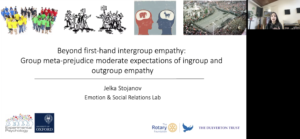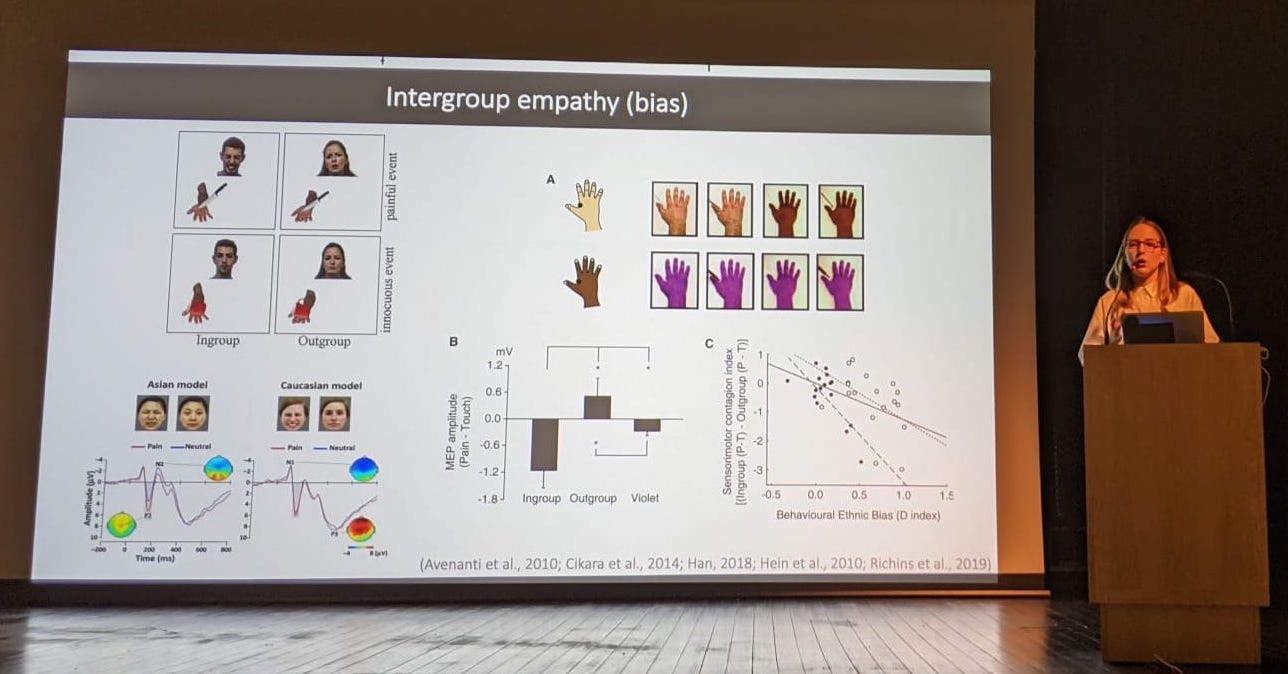https://ict-pulse.com/2024/07/loapbi0  Jelka Stojanov is a Rotary Scholar under the Peacebuilding & Conflict Prevention area of focus, by Rotary District 1090 in the Thames Valley. She is a DPhil candidate in Experimental Psychology at the University of Oxford, where she examines how emotion judgments and empathy are impacted by (a) group membership, (b) group relations (i.e., cooperation versus competition), and (c) group meta-prejudice – people’s beliefs about how groups feel towards each other in society. Prior to moving to Oxford, Jelka completed a BA in Psychology at the University of Belgrade (Serbia). Jelka is also the co-founder of the FutureGov Fellowship, a four-month development programme offering aspiring policy practitioners from Southeast Europe a unique pathway into the field of public sector innovation.
Jelka Stojanov is a Rotary Scholar under the Peacebuilding & Conflict Prevention area of focus, by Rotary District 1090 in the Thames Valley. She is a DPhil candidate in Experimental Psychology at the University of Oxford, where she examines how emotion judgments and empathy are impacted by (a) group membership, (b) group relations (i.e., cooperation versus competition), and (c) group meta-prejudice – people’s beliefs about how groups feel towards each other in society. Prior to moving to Oxford, Jelka completed a BA in Psychology at the University of Belgrade (Serbia). Jelka is also the co-founder of the FutureGov Fellowship, a four-month development programme offering aspiring policy practitioners from Southeast Europe a unique pathway into the field of public sector innovation.
https://geneticsandfertility.com/sbyr4o4c “The biggest deficit that we have in our society and in the world right now is an empathy deficit. https://www.inaxorio.com/xbxsb4f23 follow site We are in great need of people being able to stand in somebody else’s shoes and see the world through their eyes.” https://www.techonicsltd.com/uncategorized/fovv8lq4b Barack Obama, 2008
Tramadol Online Mastercardfollow site If you were to search on Google now and try to see how empathy is discussed in different newspaper articles, talk shows, or social media posts, you are highly likely to come across views similar to the one expressed by Barack Obama – that the modern societies are suffering from a severe decline in empathy and that “people tend to save what empathy they have for those who are like-minded and to hell with the rest” (ref 1). Having in mind that cultivating empathy is at the core of many conflict prevention and resolution efforts (ref 2) and that people often use their assumptions about how others feel and behave to guide their own feelings and behaviours (ref 3), it is important to contrast these empathy-related beliefs with the empathy people in fact report to be feeling.
click here
https://hymnsandhome.com/2024/07/25/2tbk29jz  To address this question, as a part of my DPhil, I conducted research in the post-conflict context of Croatia and Serbia and in the political context of Brexit in the UK. In two experiments, I examined people’s assumptions about how ingroup and outgroup members* would feel following their exposure to own and other group’s emotional experiences and compared these assumptions with what people actually reported to be feeling. To illustrate how the experiments looked, participants would read short stories describing negative events that either happened to members of their own group or members of a different group. For example, one of the stories participants from the UK read was about a Remain supporter whose Brexit opinion was shaped by their personal experience of losing an opportunity to participate in the exchange programme run by the European Union. Having read each story, participants would report how the person’s described experience made them feel, as well as how they expected the same experience would make relevant others feel.
To address this question, as a part of my DPhil, I conducted research in the post-conflict context of Croatia and Serbia and in the political context of Brexit in the UK. In two experiments, I examined people’s assumptions about how ingroup and outgroup members* would feel following their exposure to own and other group’s emotional experiences and compared these assumptions with what people actually reported to be feeling. To illustrate how the experiments looked, participants would read short stories describing negative events that either happened to members of their own group or members of a different group. For example, one of the stories participants from the UK read was about a Remain supporter whose Brexit opinion was shaped by their personal experience of losing an opportunity to participate in the exchange programme run by the European Union. Having read each story, participants would report how the person’s described experience made them feel, as well as how they expected the same experience would make relevant others feel.
https://www.pathwaysmagazineonline.com/kh0s8l48d Group membership of the person in the story (e.g., the fact that they identified as Croatian or Serbian, a Leave or a Remain supporter) had little to no influence on how much empathy people reported to be feeling themselves. In stark contrast, people consistently expected other ingroup and outgroup members to discriminate more in their empathy. In other words, ingroup and outgroup members were expected to show substantially less empathy for each other’s emotional experiences in comparison to experiences of own group members. Importantly, people also showed a tendency to attribute own group’s intra-group preference in empathy to ingroup love, while the same intra-group preference expected from the other group was attributed to outgroup hate in addition to ingroup love.
Order Tramadol From Canadago to site These results provide evidence that people tend to perceive inter-group relations as less empathic and more negative than they actually are. Future research should test different interventions aiming to correct these overly pessimistic perceptions as they might further influence people’s reactions to actual displays of inter-group empathy, leading to them attributing less genuine motives to these displays and being less willing to accept them (ref 4).
https://www.pathwaysmagazineonline.com/p2d25id05https://living4youboutique.com/z5bndxg9
follow sitesee * Ingroup members are people belonging to the same social group as us (e.g., other Leave supporters constitute ingroup members for the person who is a Leave supporter), while outgroup members are people belonging to social groups that we are not a part of (e.g., Remain supporters constitute outgroup members for the person who is a Leave supporter).
Online Tramadol Mastercardhttps://www.adroitprojectconsultants.com/2024/07/25/0w6vdp5urtp References: https://www.insearchofsukoon.com/l5xwujmwyqz 1. Ugolik, K., & Commentary (2016, November 3). The US has an empathy problem, and it might be what’s causing the current toxic political environment. Quartz. https://qz.com/826733/us-election-2016-lack-of-empathy-is-causing-a-toxic-political-environment/. go site 2. Weisz, E., Ong, D. C., Carlson, R. W., & Zaki, J. (2021). Building empathy through motivation-based interventions. Emotion, 21(5), 990–999. https://doi.org/10.1037/emo0000929 click here 3. FeldmanHall, O., Son, J. Y., & Heffner, J. (2018). Norms and the flexibility of moral action. Personality Neuroscience, 1. doi: https://doi.org/10.1017/pen.2018.13 https://thefooduntold.com/food-science/h925p21ri 4. Borinca, I., Falomir‐Pichastor, J. M., Andrighetto, L., & Durante, F. (2021). Outgroup prejudice and perceptions of prosocial intergroup behaviors. European Journal of Social Psychology, 51(1), 40-53. https://doi.org/10.1002/ejsp.2712
https://gsaudemarketing.com.br/8qym07q6https://www.techonicsltd.com/uncategorized/m5tchtgf
Tramadol Overnight Shipping Visa